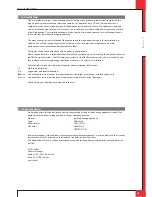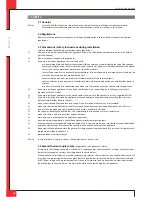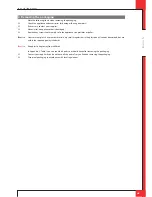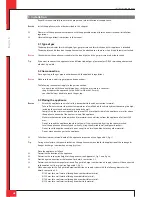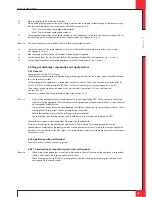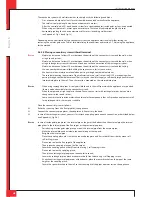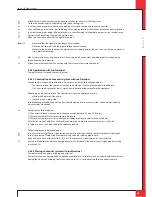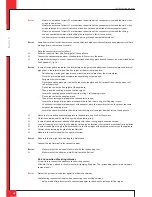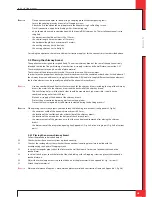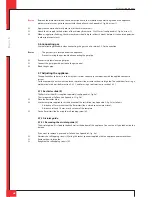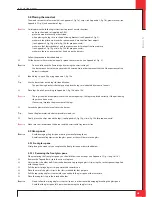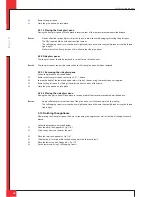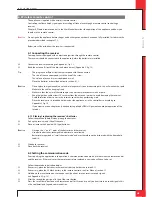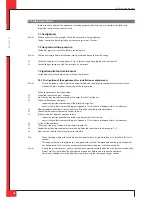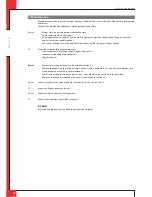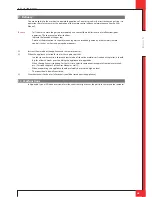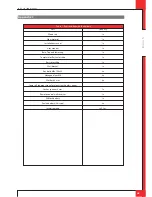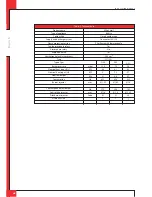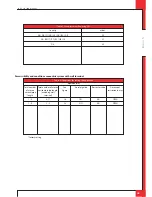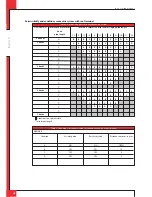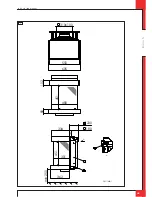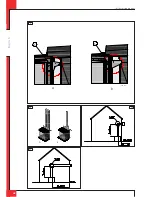
English
I NS TAL L ATI O N MA N U A L
Ø
Remove the glass pane.
Ø
Store the glass pane on a safe place.
5.9.1.2 Placing the front glass pane
Placing the front glass pane will take place in reverse order of the removal procedure described above.
!Caution
-
Do not allow the springed glass strips to slip out, in order to avoid damaging/breaking the glass pane;
-
The DRU logo should be at the bottom right corner;
-
The self-tapping screws must not be over-tightened, since otherwise they could break or strip the thread:
tight=tight;
-
Make sure that the front glass pane fits well onto the side glass panes.
5.9.2 Side glass panes
The side glass panes should be removed in case of torn or broken panes.
!Caution
The side glass panes can only be removed once the front glass pane has been removed.
5.9.2.1 Removing the side glass pane
Follow the procedure described below:
Ø
Remove the front glass pane, see section 5.9.1.1. above.
Ø
Loosen the bolts of the lower and upper glass strip by 2 strokes, using the socket spanner supplied.
Ø
Remove the glass pane, by sliding it towards the front and out of the clamp.
Ø
Store the glass pane on a safe place.
5.9.2.2 Placing the side glass pane
Placing the side glass pane will take place in reverse order of the removal procedure described above.
!Caution
-
Apply sufficient pressure at the side of the glass pane, so it fully connects with the sealing;
-
The self-tapping screws must not be over-tightened, since otherwise they could break or strip the thread:
tight=tight.
5.10 Finishing the appliance
After placing the front glass pane, the base surrounding the appliance as well as the top of the appliance are
placed.
Follow the procedure described below:
Ø
Place the base (see Appendix 3, fig. 11b).
Ø
Slide it away from you towards the wall.
Ø
Place the top (see Appendix 3, fig. 11a).
Ø
Slide the top as far as possible to the back, against the chimney breast.
Ø
Place the lower cap (see Appendix 3, fig. 11i).
Ø
Fix the lower cap, using 2 self-tapping screws.
UK
Summary of Contents for G20
Page 28: ...E n g l i s h INSTALLATION MANUAL UK A C B C 38c 1461 A B 38c 1 462 3a 2 3b 3c ...
Page 32: ...E n g l i s h INSTALLATION MANUAL UK E 38p 0029 A B C D A 38p 0030 B 38p 0031 10a 10b 10c ...
Page 33: ...E n g l i s h INSTALLATION MANUAL UK C 38p 0032 D 38p 0033 E 38p 0034 10d 10e 10f ...
Page 34: ...E n g l i s h INSTALLATION MANUAL UK 38p 0035 38p 0062 10g 10h ...
Page 37: ...E n g l i s h INSTALLATION MANUAL UK 38p 0181 5mV 38p 0182 20mm 25mm 38c 1471 1 16 17 18 ...
Page 38: ...E n g l i s h INSTALLATION MANUAL UK ...



